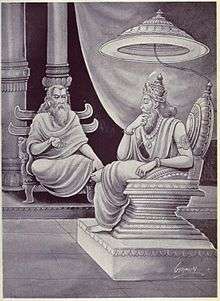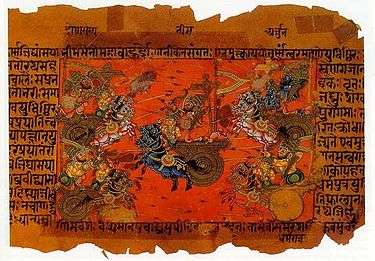Vidura
| Vidura | |
|---|---|
 Vidura (left) with Dhritarashtra | |
| Information | |
| Family |
Vyasa (father) Parishrami (mother) Pandu (half-brother) Dhritarashtra (half-brother) |


Vidura (Sanskrit: विदुर, lit. skilled, intelligent or wise) is one of the central characters in the Mahabharata, a major Hindu epic. He is described as the prime minister of Hastinapur and also the uncle of Pandavas and Kauravas.
Life
Vidura was raised and educated by Bhishma as the half-brother of Dhritarashtra and Pandu. However, since neither of his parents were of the royal blood, he was made counselor to his brothers, the kings, rather than a king himself. When Satyavati asked about her grandchildren's strengths, Bhishma praised Dhristarashtra's strength, Pandu's military prowess, and Vidura's intellect. When time came for a crown prince to be chosen, it was Vidura who brought up the elephant in the room-namely that despite being older, Dhritarashtra's blindness made him an unfit king. Vidura then supported Pandu's election to the kingship, much to the relief of Hastinapur's prime minister. Despite knowing that he was right, and even agreeing with the verdict, Dhritarashtra held a little bit of resentment towards Vidura for this incident.
Upon Pandu's abdication and the blind Dhritarashtra's succession, Vidura took on the reins of government for all practical purposes, guiding his brother's government until Duryodhana came of age, when he was consigned to a secondary role.
In some versions, it is believed that Vidura is elder to Dhritarashtra and Pandu, for when Bhishma asked Vidura for counsel on the marriages of the three princes, he indicated in order the brides for Vidura - a Yadava girl named Sulabha, Dhritharashtra - Gandhari and Pandu - Kunti, in the order of precedence accorded by age. According to this version, Ambika initially sent a maid in her place out of fear of Vyasa, and the sage perceiving an act designed by destiny for some greater purpose, blesses her with a son, making Vidura an incarnation of Dharma instead of the Mitra-Varuna pair. This event is considered to be a major transition from the Vedic to the Upanishad age. Contemporary translators, however have ignored this due to transcreations. Ambalika later was persuaded to present herself to Vyasa, but turned pale and gave birth to Pandu, as recounted above.
Vidura's Role in the Mahabharata
Barring Krishna, Vidura was most respected as an adviser by the Pandavas, whom he forewarned on various occasions of Duryodhana's plots to exterminate them, such as Duryodhana's plan to burn them alive in the house of wax.
Excepting the prince Vikarna, Vidura was the only one who protested against the humiliation of Draupadi in the Kaurava court. In that moment, Duryodhana viciously rebuked Vidura, calling him ungrateful. Dhritarashtra moved to rebuke Duryodhana for insulting Duryodhana's uncle, but, remembering Vidura saying that a blind man cannot be king, holds his tongue, and instead reprimanded Duryodhana for insulting the prime minister. It is that incident that Vidura brought up years later when he severed ties with the Kurus and sided with the Pandavas at the onset of the Kurukshetra war. Unlike Bhishma, Dronacharya, Kripacharya, Karna, etc., Vidura did not have an obligation to Hastinapur or Duryodhana, but to his family. Hearing Dhritarashtra not acknowledge that relationship, Vidura felt compelled to side with dharma and the Pandavas.
According to Krishna, Vidura was considered as Dharmaraja, which means the lord of truth. Krishna respected Vidura for his devotion to people's welfare, and his proficiency in every sphere of knowledge.
When Krishna visited Hastinapura as a peace emissary of the Pandavas, he shunned Duryodhana's offer to stay in the royal palace, preferring instead the home of Vidura, on account of him being the only neutral man in the Kaurava court. The reason Krishna stayed in Vidura's chambers for the night instead of Duryodhana's is due to the thoughts which were running through their heads and the difference between them. Duryodhana's intention was to heave luxury upon Krishna and convince him to join the Kaurava's side. Sensing this intention, Krishna refused. Krishna knew the food that Vidura presented was presented with love and affection with no ulterior motive.
In the Sanatsujatiya section of the Mahabharata, shortly before the Kurukshetra War began, Vidura invoked the sage Sanatsujata to answer Dhritarashtra's questions about death. In protest against the Kurukshetra War, Vidura resigned from the post of minister.
Post-War
As Duryodhana is dying, Krishna comes to him, and the two talk about the strategic mistakes Duryodhana had made. One of these was Duryodhana's failure to recruit Vidura. Vidura's brilliant mind would have been a huge boon to the Kaurava tactics, rivaling Krishna on the Pandavas' side.
After the great battle, Yudhishthira appointed Vidura the prime minister with complete control of the government. However, following the carnage of the war and his own age, Vidura did not have the heart to govern. Soon after, he retired to the forests as an ascetic with his half-brother Dhritarashtra and his sisters-in-law Gandhari and Kunti. He undertook severe penances and was the first of the royal ascetics to die.
Legacy
Vidura is considered as the Mahachohan in the Theosophical world. Mahachohan is said to be the chief of a Social Hierarchy of the trans-Himalayan mystics.[1]
Vidura-niti, or Vidura's Statecraft, narrated in the form of a dialogue between Vidura and King Dritrashtra, is considered the precursor in some ways of Chanakyaneeti.
Vidura is held to be a paragon of truth, dutifulness, impartial judgement and steadfast dharma. He is considered the embodiment of the inner consciousness of the Mahabharata.
In popular culture
Kaka Vidura, a Hindi minor poem by Rambhadracharya, has Vidura and his wife Sulabha as central characters.
See also
References
- ↑ Parvathi Kumar, K., Wisdom Teachings of Vidura, 1997, Dhanishta
External links
| Wikimedia Commons has media related to Vidura. |

